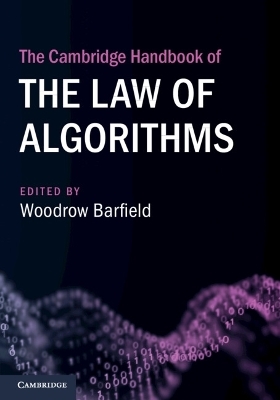
The Cambridge Handbook of the Law of Algorithms
Cambridge University Press (Verlag)
978-1-009-29315-0 (ISBN)
Algorithms are a fundamental building block of artificial intelligence - and, increasingly, society - but our legal institutions have largely failed to recognize or respond to this reality. The Cambridge Handbook of the Law of Algorithms, which features contributions from US, EU, and Asian legal scholars, discusses the specific challenges algorithms pose not only to current law, but also - as algorithms replace people as decision makers - to the foundations of society itself. The work includes wide coverage of the law as it relates to algorithms, with chapters analyzing how human biases have crept into algorithmic decision-making about who receives housing or credit, the length of sentences for defendants convicted of crimes, and many other decisions that impact constitutionally protected groups. Other issues covered in the work include the impact of algorithms on the law of free speech, intellectual property, and commercial and human rights law.
Woodrow Barfield holds a Ph.D. in engineering, a J.D., and LL.M. A recipient of the NSF Presidential Young Investigator Award, Dr Barfield is the editor of Fundamentals of Wearable Computers and Augmented Reality (2015) and co-editor of Research Handbook on the Law of Artificial Intelligence (2018). He is currently an associate editor of the Virtual Reality Journal, review editor for Frontiers in Artificial Intelligence, and an editorial board member for Delphi: Interdisciplinary Review of Emerging Technologies.
Part I. Introduction and Setting the Stage for a Law of Algorithms: 1. An introduction to law and algorithms Woodrow Barfield and Jessica Barfield; 2. The opinion of machines Curtis E. A. Karnow; 3. Private accountability in an age of artificial intelligence Sonia K. Katyal; 4. Algorithmic legitimacy Ari Ezra Waldman; 5. Understanding transparency in algorithmic accountability Margaret Kaminsky; Part II. Business, Regulations, and Decision Making with Algorithms: 6. Algorithms and contract law Lauren Henry Scholz; 7. Algorithms, agreements, and agency Shawn Bayern; 8. Algorithmic governance and administrative law Steven M. Appel and Cary Coglianese; 9. Discrimination in the age of algorithms Robin Nunn; 10. Algorithmic competition, collusion and price discrimination Salil K. Mehra; 11. The rule of law and algorithmic governance Ronan Kennedy; 12. Governance of algorithms: rethinking public sector use of algorithms for predictive purposes Anjanette H. Raymond and Ciabhan Collelly; 13. From rule of law to statute drafting: legal issues for algorithms in government decision-making Monika Zalnieriute, Lisa Burton Crawford, Janina Boughey, Lyria Bennett Moses and Sarah Logan; 14. Algorithmic decision systems: using automation and machine learning in the public administration David Restrepo Amariles; 15. From legal sources to programming code: automatic individual decisions in public administration and computers under the law Dag Wiese Schartum; Part III. Intellectual Property and Algorithms: 16. Inventive algorithms and the evolving nature of innovation Ryan Abbott; 17. Software patenting and Section 101's gatekeeping function Andrew Chin; 18. Intellectual property as a crossroad: awarding IP protection for algorithms Aviv Gaon; Part IV. Criminal Law, Tort Issues and Algorithms: 19. The use of algorithms in criminal adjudication Andrea Roth; 20. Assessing risk of offending through algorithms Christopher Slobogin; 21. Injury by algorithms Seema Ghatnekar Tilak; 22. When do algorithmic tortfeasors that caused damage warrant unique legal treatment? Karni Chagal-Feferkorn; Part V. Constitutional Law, Human Rights, and Algorithms: 23. Tort-law applying a 'reasonableness' standard to algorithms Karni Chagal-Feferkorn; 24. Human rights-based approach to AI and algorithms: concerning welfare technologies Jedrzej Niklas; 25. Four modes of speech protection for algorithms Kyle Langvardt; 26. Algorithms and freedom of expression Manasin (Veenu) Goswami; 27. Artificial minds in first amendments borderlands Marc Jonathan Blitz; 28. The first amendment and algorithms Stuart Minor Benjamin; 29. Algorithmic analysis of social behavior for profiling, ranking, and assessment Nizan Geslevich Packin and Yafit Lev-Aretz; 30. Algorithmic stages in privacy data analytics: process and probabilities Ronald P. Loui, Arno R. Lodder, and Stephanie A. Quick; Part VI. Applications and Future Directions of Law and Algorithms: 31. Moral machines: the emerging EU policy on 'Trustworthy AI' Andrea Renda; 32. Law in the Turing's Cathedral Nicola Lettieri; 33. Arguing over algorithms: mapping the dilemmas in operationalizing 'ethical' artificial intelligence Mariano-Clorentino Cuellar and Robert J. MacCoun; 34. Embodiment and algorithms for human robot interaction Yueh-Hsuan Weng and Chih-Hsing Ho; 35. On being trans-human: commercial BCIs and the quest for autonomy Argyro P. Karanasiou.
| Erscheinungsdatum | 20.03.2023 |
|---|---|
| Reihe/Serie | Cambridge Law Handbooks |
| Zusatzinfo | Worked examples or Exercises |
| Verlagsort | Cambridge |
| Sprache | englisch |
| Maße | 178 x 254 mm |
| Gewicht | 1479 g |
| Themenwelt | Naturwissenschaften |
| Recht / Steuern ► Allgemeines / Lexika | |
| Recht / Steuern ► EU / Internationales Recht | |
| Recht / Steuern ► Wirtschaftsrecht ► Urheberrecht | |
| ISBN-10 | 1-009-29315-X / 100929315X |
| ISBN-13 | 978-1-009-29315-0 / 9781009293150 |
| Zustand | Neuware |
| Haben Sie eine Frage zum Produkt? |
aus dem Bereich


